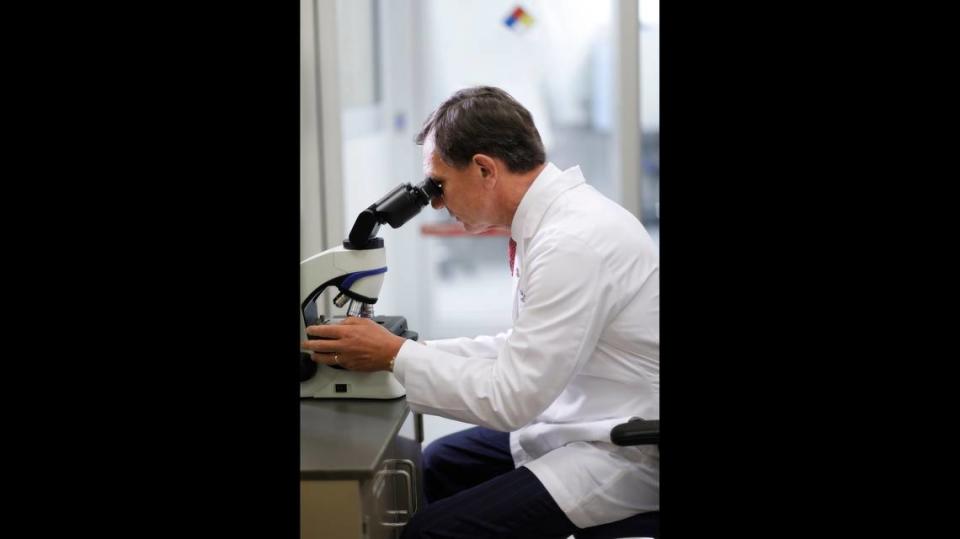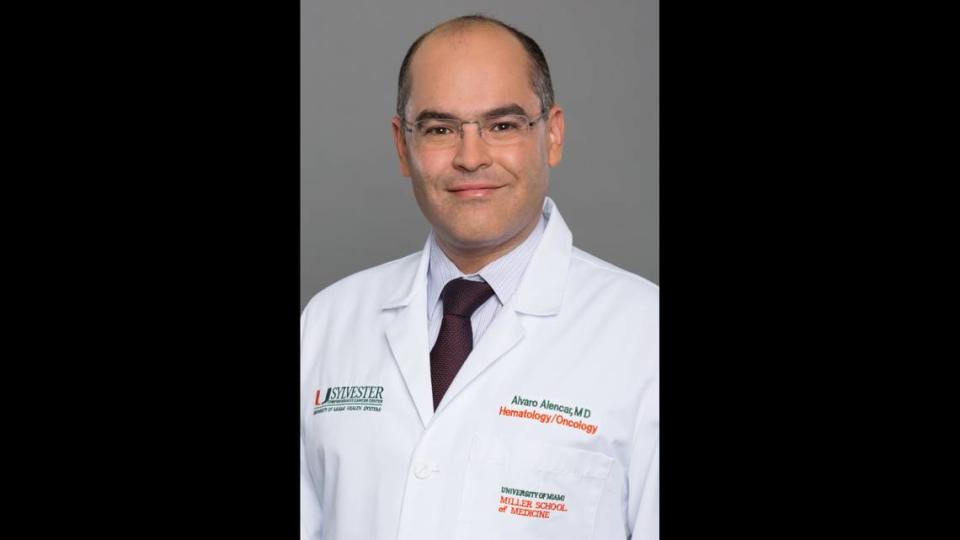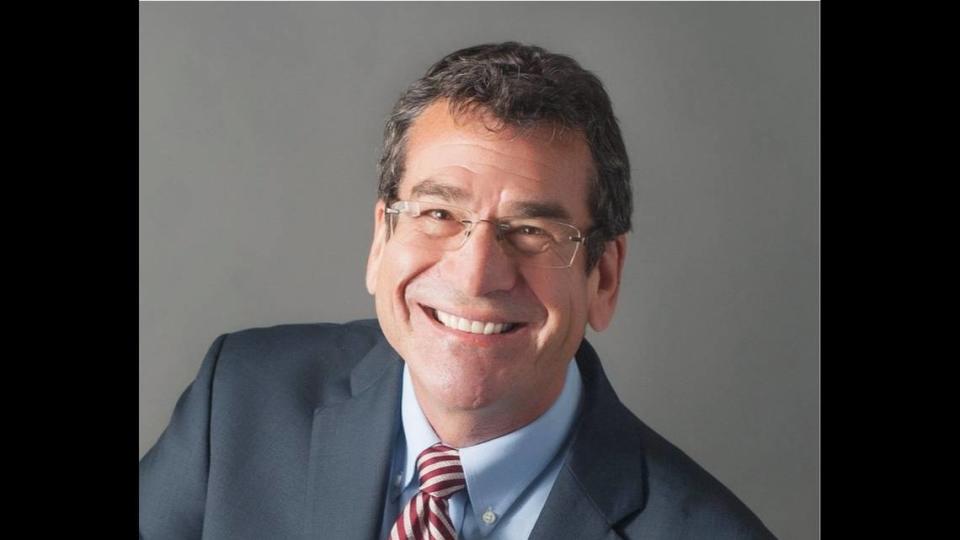Sylvester, Miami Cancer Institute studying stem cells, cancer drugs to treat COVID-19
With more and more people contracting COVID-19, physician-scientists around the world are looking at existing drugs as potential treatments for the novel coronavirus.
Among them are cancer researchers launching new clinical trials or participating in multi-site ones to see whether drugs proven to be effective for another disease, particularly cancer, can help in treating COVID-19 cases.
At Miami Cancer Institute, part of Baptist Health South Florida, researchers are conducting several trials to investigate whether existing cancer drugs might provide some kind of therapy for COVID-19. The rationale: Cancer patients have similar immune system problems as coronavirus patients — namely, dangerous inflammation — and these medications effectively attack that problem.
One of the most notable treatments is intravenous infusions of mesenchymal stem cells, or MSC cells, for COVID patients who are in severe respiratory distress. The U.S. Food and Drug Administration approved MSC treatments in early April under the agency’s expanded access compassionate use.
In the Miami Cancer Institute trial, MSC cells are harvested from the lining of the umbilical cord (they can also be derived from bone marrow). MSCs are known to reduce inflammatory reaction in cases of rheumatoid arthritis and cancer.
MCI physician/scientist Dr. Guenther Koehne is applying what scientists know about the inflammation-busting qualities of the treatment to tamp down the inflammation that results in severe COVID-19 cases, preventing the person from breathing.
By early May, Koehne and his colleagues from the intensive care unit at Baptist Health had treated four critically ill COVID patients with the MSC cells under what is known as an individual Emergency Investigational New Drug (EIND), approved by the FDA.

All patients, who had several underlying risk factors, including low blood pressure, multi-organ failure and obesity, were intubated in the ICU. After the MSC infusion, three were extubated and recovering. The fourth patient, most recently treated, died 24 hours after the infusion before any effect could be observed.
“These stem cells have the ability to reduce the massive cytokine storm that the virus triggers, which is basically when the immune system’s going on overdrive,” says Koehne., an expert in allogeneic and autologous stem cell transplantation and treating viral infections. “And when that happens, your body is attacking not only the virus but also your healthy cells.”
Cytokine storms can happen at any age and they’re not unique to COVID-19. But when coronavirus patients’ immune systems go haywire, the storms tend to trigger acute respiratory distress syndrome (ARDS). In this life-threatening situation, fluid leaks into the lungs, making breathing practically impossible.
The patients who received this MSC treatment showed reduction of their oxygen requirement from 100% to less than 50% within days of the infusion, accompanied by significant reduction in key circulating inflammatory markers.
“So far, we are seeing relatively promising outcomes [with coronavirus patients],” Koehne says.
Koehne, and Dr. Javier Pérez-Fernández, a pulmonologist and director of critical care at Baptist, are working closely with RESTEM, a biotechnology company based in California. RESTEM has applied to the FDA for permission to launch a clinical trial using these MSC infusions.
If the FDA approves the initial phase of trial, from 40 to 60 patients could be treated either with a placebo or the stem cells.
In addition, Koehne’s team is also studying the use of Tocilizumab for seriously ill COVID-19 patients. The 40 South Florida patients who initially received doses of this arthritis and cancer medication have recovered.
Across town, researchers at the University of Miami Health System have also participated in experimental treatment of critically ill COVID-positive patients. On one front, UM has provided clinicians in Miami and Maryland with MSCs harvested from bone marrow and cultured at the Interdisciplinary Stem Cell Institute lab. Six people have received this infusion — one of them at Jackson Memorial Hospital — and all have shown improvement.
At Sylvester Comprehensive Cancer Center, part of UM’s Miller School of Medicine, Dr. Alvaro J. Alencar, lymphoma specialist and medical director of the University of Miami Hospital and Clinics Hematology/Oncology Inpatient Unit, is looking into another cancer-fighting drug that may work for the coronavirus. This particular one, for now known as TL-895, is a new agent that belongs to a group of drugs known as Bruton Tyrosine Kinase (BTK) inhibitors.

BTK is an important protein in the function of B cells, those important white blood cells that help protect our bodies from infection. The BTK protein helps activate B cells to fight infections and inflammation.
Sometimes, however, your body can produce abnormal B cells, causing B-cell malignancies, or produce excess inflammation as is seen in the severe lung damage triggered by COVID-19.
Currently, FDA-approved BTK inhibitors — ibrutinib (Imbruvica), acalabrutinib (Calquence), and zanubrutinib (Brukinsa) — treat B-cell malignancies such as chronic lymphocytic leukemia (CLL) and mantle cell lymphoma.
Sometime this month, Alencar and his UM team expect to join a multinational Phase I-II clinical trial using TL-895 to treat cancer patients who have respiratory symptoms from COVID-19. The idea is that by blocking BTK, one can decrease the excessive inflammation that damages the lungs in COVID-19 and help patients recover faster.
Phase I studies are designed to first evaluate the safety of new agents in a few initial patients. Once the safety is confirmed in the phase I portion, the study would go to a phase II, in which approximately 130 patients are randomized between the study drug or placebo. All patients participating in the study would continue to receive the existing standard of care for their COVID-19 infection.
“By inhibiting BTK, you reduce the inflammation,” Alencar explains. “That, in turn, reduces the lung damage [created by the COVID-caused cytokine storm].”
Alencar is optimistic based on the known safety of BTK inhibitors with cancer patients as well as experimental trials with animal models of BTK inhibitors in severe lung inflammation.
In addition to these studies, researchers are drawing on a wide arsenal of treatment to defeat the coronavirus by trying to attack the virus at different stages of its infection journey.
A clinical trial exploring Selinexor, an existing cancer drug, has entered Phase II at Miami Cancer Institute and other research sites. Selinexor (also known as Xpovio) is used to prevent cytokine storm. It’s prescribed for relapsed or refractory multiple myeloma and is also being studied for use in patients with lymphoma, endometrial cancer and glioma.
Unlike the MSC treatment for critically ill coronavirus patients, this study targets COVID-19 patents who are only moderately sick. It’s the first of its kind to treat a viral infection with what is known as XPO1 inhibitor. By blocking, or inhibiting, the XPO1 protein, it reduces inflammation.

“We want to focus on patient outcome and access to a broad spectrum of experimental therapeutics,” says Dr. Scott Lipkin, chief research officer for Miami Cancer Institute. “We may find that it’s one drug that works or a combination of them, and I’m confident that we will find [effective treatment]. It’s not a matter of if, but when. We will get our arms around this.”

